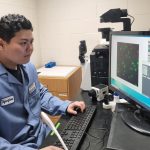Johns Hopkins, GE Global Research Partner to Create Portable Diagnostic Device to Combat Infectious Diseases

Infectious diseases like influenza, tuberculosis, and Ebola are an increasing threat to countries around the world. As the concern grows, so, too, does the need for better diagnostic tools that can identify these infections as soon as possible.
To address this global challenge, a team of clinical and industry experts, including Jeff Wang, professor of mechanical engineering at Johns Hopkins University, is developing a new diagnostic platform that can quickly identify and characterize pathogens responsible for many infectious diseases.
Wang is working with co-investigator Christopher Puleo, a lead biomedical engineer at GE Global Research and a Hopkins alumnus (PhD ’09). Collaborators also include researchers from Stanford University, Penn State University, and Key Tech, Inc.
The team received a three-year, $6 million grant from the Medical CBRN Defense Consortium (MCDC), a Department of Defense initiative to advance pharmaceutical and diagnostic requirements as related to enhancing the mission effectiveness of military personnel.
Rapid diagnosis and treatment is essential for saving the lives of soldiers and civilians, especially in remote areas where medical resources are limited. For example, early diagnosis is key for the treatment of wounds and infections that can lead to sepsis, in which appropriate interventions within a 6-hour window are critical for preventing death.
But a major problem with infectious disease management is that infectious agents are constantly evolving; strains can quickly become resistant to the antibiotics usually prescribed to treat them. Diagnoses and treatment plans often rely on Antimicrobial Susceptibility Testing (AST), a procedure used to determine which antibiotics a specific organism is susceptible to.
According to the researchers, the goal of the MCDC-funded project is to improve current AST methods. They plan to build a new, single-molecule based diagnostic platform that can produce rapid AST results and broad spectrum pathogen identification in less than one hour, as compared to two or three days using conventional culture-based testing.
“Our proposed diagnostic platform seamlessly integrates a droplet microfluidic-based sample preparation device with single-molecule detection of bacterial replication to deliver the result of antimicrobial susceptibility before the bacteria starts to multiply,” said Wang.
The new method could ultimately allow clinicians to make faster, more accurate diagnoses and ensure patients receive the best possible treatments. After clinical testing, the team aims to translate the technology into a portable prototype for both military and commercial use.
“The capability of rapid profiling of bacterial pathogens and antimicrobial susceptibility like that of our single-molecule diagnostic platform will facilitate evidence-based treatment at the first health care visit, which is of prime importance to improving patient care and combating the emerging crisis of multi-drug resistant pathogens,” said Wang.
Story by: Catherine Graham





